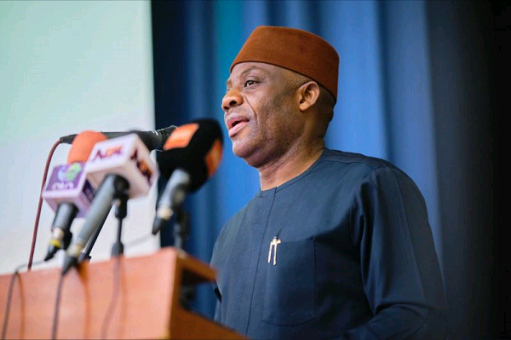The Minister of Education, Dr. Tunji Alausa has said the federal government was considering a shift to a 12-year basic education model in Nigeria.
The minister said the proposal would be considered at the ongoing Extraordinary National Council on Education, a meeting of the highest policy making body holding in Abuja.
Nigeria currently operates the 9-3-4 system, which consists of nine years of basic education, three years of senior secondary education, and four years of tertiary education.
However, Alausa pointed out that some of the issues influencing the convening of the extraordinary National Council of Education meeting include the introduction of a 12-year basic education system in Nigeria’s education framework and the approval of a national policy on bullying, among others.
“It is important to acknowledge that while the 9-3-4 system of education has its merits, it also has drawbacks, such as the need for students to work to further their education,” Alausa explained.
He added: “It is therefore prudent to transition from the 9-3-4 to the 12-4 system of education. By doing so, Nigeria will align with global standards in preparing students for better tertiary education.”
“A 12-year basic education model will ensure a continuous, uninterrupted curriculum, promoting better standardization and fostering quality assurance in the education system.
“It will also guarantee that students receive a more comprehensive and continuous learning experience, improve educational outcomes, and contribute to a more educated populace that drives Nigeria’s economic development.
“A second key agenda to be discussed today at the extraordinary meeting is the conversion of federal science and technical colleges into federal technical colleges.”
He also mentioned that the Council would be discussing the 16-year policy on admission into tertiary institutions, which is to be incorporated into the national policy on education.
The minister said: “I am sure many of you have heard about the challenges we face as a nation with talented, bright students being disenfranchised from pursuing tertiary education. In any society, it is crucial to standardize the education of exceptionally gifted students who are highly functional.
“We are now preventing these students, after finishing secondary education at the age of 16, from attending university until they are 18. This delays their development and harms their futures. These students are capable and brave. If we leave them idle, we risk exacerbating mental health issues.”
Regarding the conversion of federal science and technical colleges to federal technical colleges, the Minister emphasised that technical education, which imparts practical and applied skills alongside basic scientific knowledge, is crucial for addressing the current skills gap in the labour market.
“The provision of technical education allows a nation’s human and natural resources to be harnessed more effectively. Therefore, technical education contributes significantly to national development, driving cultural and industrial progress,” he stated.
Minister of State for Education, Prof. Suwaiba Said Ahmad said to cope with the emerging issues in the education sector, the present administration’s focus was on implementing existing education policies rather than introducing new ones, to improve quality, equity and human capital development, especially through the education of women and girls, viewing it as a powerful means to break the cycle of poverty.
“However, new and relevant ideas must be injected into the system to reshape the education system, emphasising technical and vocational education training to empower young men and women to be self-sufficient and valuable contributors to the nation.
“Accordingly, this administration will also focus on preparing students with skills relevant to the job market, and enabling mechanised farming at Universities of Agriculture to help address food insecurity.
“In addition to trade and entrepreneurship, TVET curriculum which includes Renewable (Solar) and Compressed Natural Gas (CNG) will be able to provide teeming young citizens an opportunity of being technicians and entrepreneurs in these areas of future significant economic activities,” she added.

